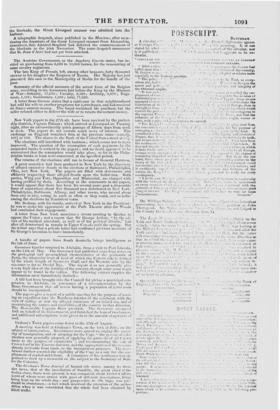New York papers to the 27th ult, have been received
by the packet- ship Garrielc, Captain Palmer ; which arrived at Liverpool on Tuesday night, after an extraordinarily quick passage of fifteen days from dock to dock. The papers do not contain much news of interest. The exchange on England remained firm at the previous rates—namely, l08;1 to 109. The shares in the Bank of the United States stood at 001.
The elections still interfered with business; which seems not to have improved. The question of the resumption of cash payments by the suspended banks is noticed in the papers ; and no doubt appeared to be entertained that the resumption would take place, so thr as the Phila- delphia banks at least were concerned, at the specified period.
The returns of the elections still ran in favour of General Harrison.
A great sensation had been produced in New York by the discovery of alleged extensive frauds in the elections at Baltimore, Philadelphia, Ohio, and New York. The papers are filled with statements and affidavits respecting these alleged frauds upon the ballot-box. Both parties, Whig and Tory, Opposition and Ministerial, are charged with having profited by them. According to the statements in the papers, it would appear that there has been for several years past a disposable force of somewhere about five thousand men distributed in New York, Philadelphia, Baltimore, Albany, and other towns, who moved about from city to city, votitc'oi. in each as often as they could, and so influ- encing the elections by fraudulent votes.
Mr. Braham, with his family, arrived at New York in the President : he was to make his appearance at the Park Theatre after the Woods had concluded their engagement.
A letter from New York mentions a recent meeting in Quebec to oppose the Union ; and a report that Sir George Arthur, " by the ad- vice of his medical attendant, as well as of his political friends," had after all determined to remain in Upper Canada until the spring. But the writer says that a private letter had confirmed previous accounts of Sir George's intention to leave immediately.


























 Previous page
Previous page